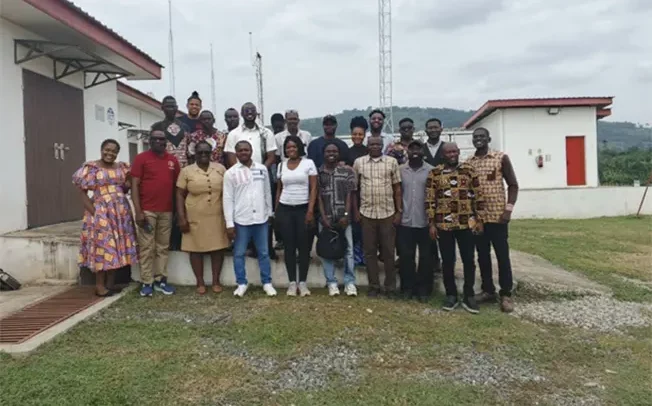The media and Zipline team in a group photograph
Zipline, a global company with operations in seven countries, headquartered in the U.S, has completed over 1.6 billion deliveries via its drone centers, with Ghana accounting for over 50% of these deliveries, cementing its position as the world’s largest autonomous delivery system.
Country Manager of Zipline, Daniel Kwaku Merki, who made the remark during a tour with the media at its office situated in Anum in the Eastern Region, stated that Zipline was founded to create the first logistics system that serves all humans equally.
“Zipline’s fully electric and autonomous drones reduce delivery emissions by up to 97% compared to gas-powered vehicles. To date, Zipline has flown more than 100 million autonomous kilometres and delivered millions of items, including over 22 million vaccine doses.
Since its launch in 2019, Zipline has served as a critical infrastructure partner for the government. It has delivered more than 8.4 million medical units,” he said.
According to Mr. Merki, they have partnered with the Ministry of Health, Ghana Civil Aviation Authority, and other stakeholders to deliver critical medical supplies, including vaccines, blood, and essential medications.
“Our distribution centers are equipped with state-of-the-art inventory management systems and warehousing facilities,” he added.
He emphasised that, they have demonstrated significant impact in Ghana, with studies showing a 56.4% reduction in maternal mortality in the Ashanti Region and a 13.1% to 37.5% increase in vaccination coverage in the Western North Region, adding that, their system has also enabled them to distribute COVID-19 vaccines efficiently across the country.
“We are committed to community engagement and development, with initiatives such as blood drives, STEM programmes, and mentorship opportunities. Our team is comprised of over 240 employees, with a significant proportion of women in leadership roles,” he mentioned.
Mr. Merki, underscored that, as they continue to expand their operations, they are exploring new use cases beyond healthcare, including agriculture and e-commerce.
“Our goal is to continue improving healthcare outcomes in Ghana through efficient and effective delivery of medical supplies. With our innovative approach and partnerships with key stakeholders, we’re confident that we can make a lasting impact in the country,” he stated.
Partnership Member, Shemau Muniru, explained that Zipline has been operating in Ghana for over six years, with six distribution centers strategically located across the country.
She added that, their centers are situated in the Eastern, Ashanti, Northeast, Western North, and other regions, enabling them to serve over 3,000 health facilities.
She reiterated that, they specialise in delivering essential medical supplies, including medications for HIV, TB, and malaria, as well as emergency commodities like anti-snake venom and vaccines.
“Our drone delivery system ensures timely and efficient transportation of these critical supplies to remote and hard-to-reach areas,” she added.
She stated that, their distribution centers are equipped with state-of-the-art inventory management systems and warehousing facilities. Every product is barcoded, allowing for accurate tracking and quality control, stating that their team of healthcare professionals, including lab scientists, nurses, and pharmacists, undergo rigorous training to ensure that products are handled and delivered safely.
“We have implemented various quality control measures, including a unified package ID system and QR code scanning, to ensure that products are delivered to the correct facilities. Our drones are designed to withstand various weather conditions, including rain and extreme temperatures,” she said.
She emphasised that, sustainability is a key aspect of their operations. “Our drones are fully electric, reducing CO2 emissions, and our packaging is biodegradable. We also engage in STEM programmes and recycling initiatives to promote environmental sustainability”.
Community Health Nurse at Tsorxor CHPS, Sandra Dede Ayayi, stated that, their community health facility has benefited significantly from partnering with Zipline, enabling them to access essential medical supplies more efficiently.
“By leveraging Zipline’s services, we can receive critical medications like paracetamol and anti-malaria drugs, which are often in short supply,” she said.
“The collaboration has increased trust and patronage in our facility, with community members now preferring to visit us for their healthcare needs. However, we still face challenges, including limited capacity and network issues. We’re working to address these concerns and improve our services to provide better care for our community,” she added.
By Janet Odei Amponsah


